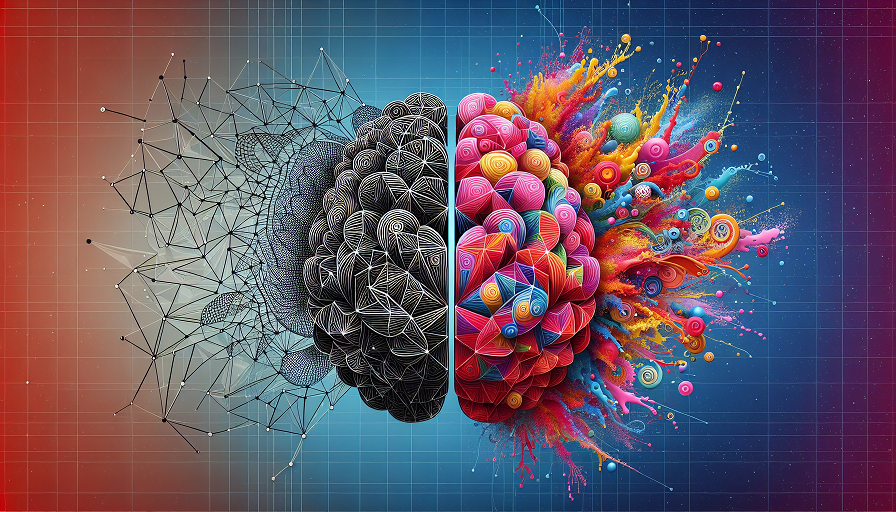
When we face challenges, the ability to think flexibly can be a game-changer. Like a gymnast who can bend and twist in various directions, a flexible mind can approach problems from multiple angles, leading to more effective solutions. Mental flexibility isn’t just an interesting concept—it could be the secret ingredient you’ve been missing in your problem-solving toolkit. Here we look at how mental flexibility works, why it’s important, and even how brain supplements might support enhancing this critical skill.
Contents
What is Mental Flexibility?
Mental flexibility, also known as cognitive flexibility, is the ability to adapt our thinking to new, unexpected, or changing situations. Rather than getting stuck in rigid patterns of thought, a flexible mind can easily switch gears, consider alternative solutions, and balance multiple concepts at once. Imagine being able to pivot swiftly from one idea to another as smoothly as if you were changing lanes on an open highway.
This skill is essential because life is inherently unpredictable. The problems we face at school, work, and in our personal lives don’t come with a manual. Whether you’re tackling a tricky math problem, negotiating a debate, or finding a new way to approach an unresolved personal conflict, the ability to think flexibly can be the bridge between hitting a wall and finding a solution.
Why is Mental Flexibility Important?
The importance of mental flexibility extends to many areas of life. In academic settings, students with greater cognitive flexibility are often better at problem-solving because they can find innovative solutions to difficult questions. At work, employees with adaptable thinking can easily shift strategies, making them valuable team members in dynamic environments. In personal relationships, cognitive flexibility helps in understanding and navigating different perspectives, leading to stronger and more empathetic connections.
Mental flexibility not only helps in solving problems but also contributes to overall mental health. Research suggests that those with higher cognitive flexibility are better at regulating their emotions and managing stress. This adaptability allows individuals to handle life’s curveballs with more resilience, reducing the likelihood of feeling overwhelmed or stuck.
How to Develop Mental Flexibility
Improving your mental flexibility is similar to exercising a muscle—it requires regular practice and a willingness to push your limits. Here are some ways to enhance this vital skill:
- Tackle new challenges: Engage in new hobbies or learn a new language. This forces your brain to adapt and grow, expanding your range of thinking.
- Practice mindfulness: Activities like meditation can help you become more aware of your thoughts, making it easier to shift mental gears.
- Question assumptions: Encourage yourself to think critically about why you hold certain beliefs and consider alternative perspectives.
- Engage in diverse discussions: Listening to others’ points of view can broaden your understanding and help you appreciate multiple solutions.
Nootropics and Brain Supplements
As interest in enhancing brain function grows, many people are turning to nootropics and brain supplements. Nootropics, sometimes referred to as “smart drugs,” are compounds that may enhance various aspects of mental function. This includes improved memory, focus, and—you guessed it—mental flexibility. While more research is needed to fully understand their effectiveness, some nootropics like L-theanine, commonly found in tea leaves, are claimed to help with relaxation and focus, potentially aiding in adaptable thinking.
Similarly, other brain supplements like Omega-3 fatty acids, often taken in the form of fish oil, have been linked with cognitive benefits and better mood regulation. A healthy brain is typically a more adaptable brain. However, it’s essential to approach these supplements with caution, ensuring you only take what is necessary and safe. Consulting with a healthcare professional before starting any supplement regimen is always a wise decision.
Everyday Strategies for Building Mental Flexibility
Beyond supplements and exercises, simply changing your daily routine can also enhance mental agility. Try rearranging your daily activities to break the monotony or take different routes during your daily commute to shake up your mind’s pattern recognition. This simple act of changing small habits can have a profound impact on your mental flexibility.
Reading diverse genres of books, from science fiction to biographies, can expose your brain to different worlds and ideas, further enhancing your ability to think flexibly. Puzzle games and brain teasers are also great fun ways to work on this skill. These activities encourage creative thinking and problem-solving, stimulating your brain to see challenges as opportunities rather than obstacles.
The Role of Physical Activity
Physical exercise is known to have a positive impact on brain health. Engaging in regular physical activity increases blood flow to the brain, which can improve cognitive functions including mental flexibility. Exercise doesn’t have to be intense to be effective: activities such as walking, yoga, and dancing can all benefit your brain. Plus, these activities often require you to think on your feet and adapt, naturally enhancing your cognitive flexibility.
Remember, the key is consistency rather than intensity. Regular, moderate exercise is sufficient to get those neurons firing in a more flexible manner. As your body becomes more adept at movement, your mind follows suit, becoming more flexible in its thinking processes.
Incorporating Mental Flexibility into Your Life
Mental flexibility is an invaluable tool that enhances our capacity for problem-solving. By understanding its importance and actively working to improve it, you empower yourself to face life’s challenges with greater ease and creativity. Whether it’s through embracing new experiences, practicing mindfulness, or considering the potential benefits of brain supplements, there are numerous ways to cultivate a more agile mind.
Mindset shifts, physical activities, and engaging in diverse and challenging activities all contribute to fostering this adaptability. Not only does it help in solving problems, but it also enriches your life by opening up new possibilities, reducing stress, and enhancing your ability to connect with others. So, take the time to nurture mental flexibility; it’s a hidden gem you’re bound to treasure in your journey through life’s challenges.

